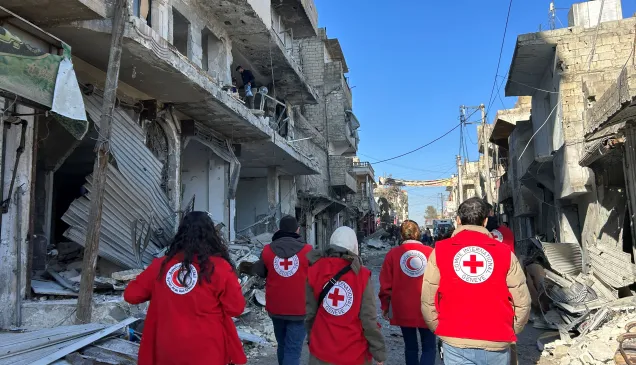I have seen the dire conditions and witnessed the efforts to manage the tens of thousands of people pouring into the camp – now hosting over 74,000 people. The needs are huge and the camp is overwhelmed.
Media attention has focused upon the fate of the foreign fighters and their families. But these are a small percentage of those in Al Hol and the other camps. Around 90% of those arriving are women and children, many of whom have been through extremely traumatic experiences. Dozens of children have died because of the cold and conditions in Al Hol in the last weeks.
Our team met one 24-year-old woman who had given birth on her way to the camp. Her other children slept next to her, on the floor. In ten hours since arriving at the camp with a huge number of other people, they were still waiting for water, food and a tent to sleep in. She barely spoke, but managed to tell us that her newborn was taken to the doctor.
All of these people are human beings who are entitled to humane treatment. Let’s not allow fiery rhetoric around the foreign fighters blind us to the suffering arising out of the humanitarian emergency in north-eastern Syria today.
Showing moral courage in the face of public anxiety and political pressure, is hard. But we are better than this. The Geneva Conventions, 70 years old this year, leave no-one, no matter what crimes they may have committed, outside the boundaries of the law.
We call for States to show this courage. To treat everyone humanely and with dignity, and in accordance with the law, including due legal process. To keep families together, wherever possible. To ensure more resources to allow sufficient humanitarian assistance. And to resist the pressure to use dehumanizing language, which only perpetuates the problem.
In Al Hol camp, together with the Syrian Arab Red Crescent (SARC), we are doing the best we can to feed the new arrivals, ensure access to water, provide tents and basic medical care, and put families back in touch. But its clear much more is needed – more shelter, more food, more clean water, better sanitation, more health services.
Elsewhere in Syria - eight years into this disastrous conflict - the violence is not over. There has been recent escalation of fighting and violence in some areas in and around Idlib. Tens of thousands of people have been displaced as a result of the new wave of hostilities. Any further resurgence of violence will worsen their situation even further.
|
Providing relief in Al Hol camp In Al Hol camp, together with the Syrian Arab Red Crescent society (SARC), the ICRC:
|
For further information, please contact:
Sara Alzawqari, ICRC Beirut, +961 3 138 353
Jenny Tobias, ICRC Geneva, +41 79 447 37 26
Matthew Morris, ICRC London, +44 7753 809471
Frederic Joli, ICRC Paris, +33 6 20 49 46 30
Galina Balzamova, ICRC Moscow, +7 903 545 35 34
Elizabeth Gorman Shaw, ICRC Washington DC, +1 202 361 1566
Pat Griffiths, ICRC Canberra, +61 418 485 120



